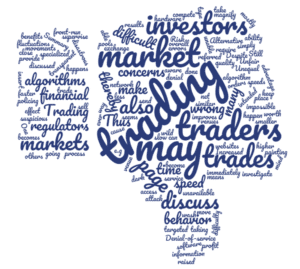Disadvantages of High-frequency Trading
There are a number of disadvantages of high-frequency trading that investors should be aware of. At the same time, investors should keep in mind that high-frequency trading has been mostly beneficial. On the page on benefits of high-frequency trading, we discuss many of the advantages of algorithmic trading and high-frequency trading.
Still, the following concerns are worth mentioning. On this page, we discuss the most important concerns raised with regard to algorithmic trading and high-frequency trading.
Unfair speed advantage
One way in which high-frequency traders are able to make a profit is simply by being faster than others. This may provide some traders the ability to front-run other investors’ trades.
Magnification of market movements
Trading algorithms may magnify fluctuations in financial markets. For example, a sell off may trigger some of these algorithmic traders to close down positions, thereby magnifying a downward trend. They may also take short positions and continue to increase such positions as long as the market is falling, thereby amplifying the move.
Market manipulation
High-frequency traders may engage in market manipulation. This can be done by spoofing, quote stuffing, wash trading, or painting the tape. We discuss these kinds of market manipulation on the page on suspect trading behavior.
Risk of trading errors
The high speed with which high-frequency traders execute trades also means that if things go wrong, they tend go wrong quickly. Thus, the results may be disastrous if the trades are not as intended. When this happens, it is referred to as an algorithm “going wild’.
Denial-of-service
If trading algorithms send too many orders to a market venue at the same time, it may happen that the exchange is unable to process all of the trades immediately. This may cause the network to become slow or unavailable. It is similar to a denial of service attack that is targeted at websites.
Increased difficulty of policing
As trading is taking place at ever higher speeds, it becomes difficult for regulators to supervise markets. Alternative venues, which are less transparent (e.g. dark pools) also make it more difficult for regulators to investigate suspicious trading behavior.
Unequal access to information
To trade against other high-frequency traders require specialized hardware and software. Thus, it is impossible for smaller investors to compete with high-frequency traders.
Summary
We discussed some disadvantages of algorithmic trading and high-frequency trading. Despite these disadvantages, the net effect seems to be that it improves the overall quality of financial markets.

